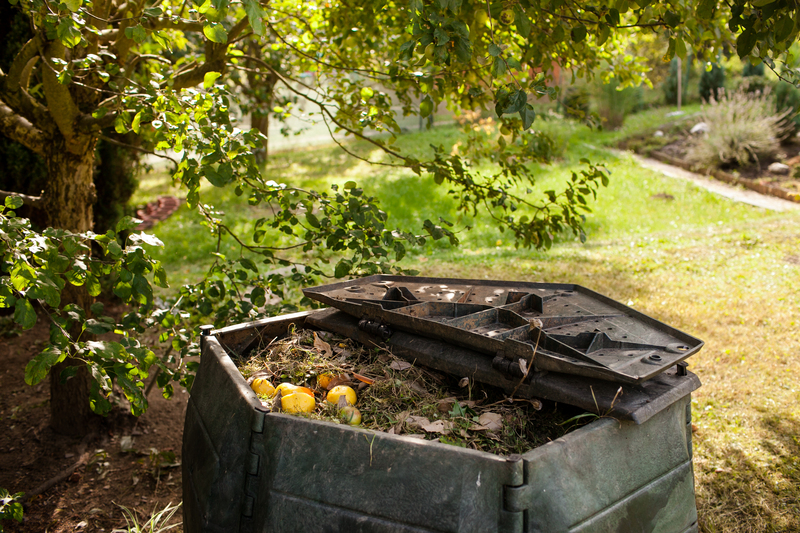Transformative Refuse Management Techniques
Posted on 16/12/2024
In the wake of rapid urbanization and ever-increasing consumerism, refuse management has emerged as a critical environmental and public health challenge. Traditional waste disposal methods such as landfilling and incineration are no longer sufficient. Innovative and sustainable refuse management techniques have become necessary to tackle the burgeoning problem of waste. This article delves into the transformative approaches in refuse management that are reshaping how societies deal with waste.
The Inefficacy of Traditional Waste Management
Conventional methods such as landfilling and incineration are fraught with limitations. Landfills are notorious for their propensity to create methane, a potent greenhouse gas that significantly contributes to global warming. Incineration, while reducing the volume of waste, releases harmful pollutants and toxins into the atmosphere. These conventional methods are not aligned with the principles of sustainability, thus rendering them unsuitable for the long-term.

Zero Waste Philosophy
The zero waste philosophy is one of the most compelling paradigms in modern refuse management. It advocates for the redesign of resource life cycles to ensure that all products are reused. The essence of zero waste is to transform consumption and waste habits, encouraging individuals and businesses to make more sustainable choices. The practical application of this philosophy involves robust recycling programs, composting, and the elimination of single-use plastics.
Advanced Recycling Techniques
Recycling is not a novel concept, but recent advancements in technology have made the process more efficient and effective. Innovative sorting systems, powered by artificial intelligence (AI) and robotics, considerably enhance the separation of recyclable materials. These technologies can identify and sort materials at a speed and accuracy that far surpasses human capability. Additionally, chemical recycling processes are being developed to break down plastics into their original monomers, thus facilitating the creation of new products of identical quality.
Composting and Organic Waste Management
Organic waste constitutes a significant portion of municipal waste, and it is highly amenable to sustainable management. Composting transforms organic waste into nutrient-rich compost, which can be utilized in agricultural and landscaping applications. Advanced composting systems have been developed to handle larger volumes of organic waste more efficiently. Moreover, anaerobic digestion complements composting by converting organic waste into biogas, which can be used as a renewable source of energy.
Waste-to-Energy (WtE) Technologies
While not entirely new, Waste-to-Energy (WtE) technologies have undergone substantial refinement. These technologies convert various types of waste materials into usable energy forms such as electricity, heat, or fuel. Modern WtE facilities are designed to minimize environmental impact, with state-of-the-art filtration systems that mitigate the release of harmful emissions. Pyrolysis and gasification are two cutting-edge WtE methods that decompose waste at high temperatures in the absence of oxygen, yielding syngas which can be harnessed for energy production.
Extended Producer Responsibility (EPR)
Extended Producer Responsibility (EPR) is a policy approach under which producers are given a significant responsibility--financial and/or physical--for the treatment or disposal of post-consumer products. The rationale behind EPR is to incentivize product design that emphasizes recyclability and reusability. By making producers responsible for the end-of-life management of their products, EPR encourages the development of more sustainable products and waste management solutions.
Smart Waste Management Systems
The advent of smart technology has introduced revolutionary changes in managing waste more effectively. IoT-enabled (Internet of Things) smart bins equipped with sensors can monitor waste levels in real time and optimize collection routes, saving time and fuel for waste collection trucks. These systems can also detect types of waste and ensure they are directed to the appropriate recycling or disposal facility. Smart waste management has the potential to significantly reduce costs and environmental impacts associated with waste collection and transportation.
Community Involvement and Education
The success of any waste management program hinges significantly on community involvement and education. Awareness campaigns and educational programs can empower individuals and communities to adopt more sustainable waste practices. Schools, community centers, and organizations are increasingly participating in waste reduction programs, recycling drives, and composting workshops. By fostering a culture of sustainability, communities can significantly reduce their overall waste footprint.
International Collaboration and Policy Making
Waste management is a global issue that transcends national boundaries. International collaboration and unified policy-making are crucial for addressing the challenges posed by waste. Organizations like the United Nations Environment Programme (UNEP) and the International Solid Waste Association (ISWA) play pivotal roles in fostering global cooperation. Policies such as the Basel Convention and the Circular Economy Action Plan by the European Union are crucial frameworks guiding international waste management efforts.
Circular Economy: A Paradigm Shift
The Circular Economy represents a transformative shift from the linear "take, make, waste" model to a regenerative system where waste is minimized, and resources are continually reused. Embracing a circular economy involves redesigning products for longevity, reparability, and recyclability, thus significantly reducing waste streams. Countries and corporations are increasingly adopting circular economy principles to ensure sustainable growth while protecting the environment.
The Role of Innovation and Research
Innovation and research are the cornerstones of advancing refuse management techniques. Investment in research and development can yield groundbreaking technologies and methods to manage waste more effectively. From improving recycling processes to developing biodegradable materials, innovation is crucial for addressing the multifaceted challenges of waste management. Universities, research institutions, and corporations must collaborate to accelerate progress in this critical field.

Challenges and Future Prospects
Despite the transformative potential of modern refuse management techniques, numerous challenges remain. Financial constraints, regulatory hurdles, and public resistance can impede the adoption of innovative waste management practices. Nonetheless, the future holds immense promise. As technology advances and awareness grows, more sustainable and efficient waste management solutions will continue to emerge. Policies that support innovation, coupled with community engagement and international cooperation, will be vital in overcoming these challenges.
Conclusion
Transformative refuse management techniques are essential for addressing the escalating waste crisis. From zero waste philosophies and advanced recycling techniques to Waste-to-Energy technologies and smart waste systems, innovative approaches are paving the way for a more sustainable future. Community involvement, international collaboration, and continued research and innovation are critical in this endeavor. As societies evolve, so too must our approaches to managing waste, ensuring a cleaner and more sustainable planet for future generations.
Latest Posts
Innovations Aiming to Reduce Ocean Waste
Reducing Waste in Christmas Celebrations




 020 3743 9508
020 3743 9508


